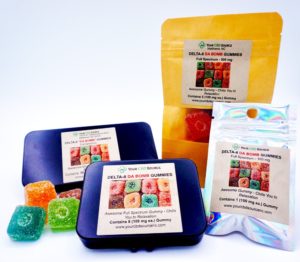100mg vs 200mg Delta 8 Gummies –...
June 25, 2025

Is Delta 8 legal in North Carolina? It’s a question we hear a lot, and it’s an important topic to understand if you’re thinking about purchasing Delta 8 in North Carolina. At Your CBD Source, we want you to have the most current and complete information about the products we offer, so we’ve created this guide to Delta 8 North Carolina law in order to help you make more informed purchase decisions.
Delta 8 THC has been rapidly rising in popularity since the enactment of the 2018 Farm Bill—which effectively removed hemp from the federal Controlled Substances list. Because the Delta 8 cannabinoid can be extracted from industrial hemp and is completely separate from its cousin Delta 9 (the main psychoactive compound in cannabis—what we commonly recognize as “THC,”), the Farm Bill paved the way for a whole new unexpected market outside of CBD.
But the rise of Delta 8 has caused many states—and even the FDA—to take notice. And while Delta 8 was once believed to be legal everywhere CBD is legal, a growing number of states are now imposing restrictions.
States like Delaware, Idaho, Montana, North Dakota, Rhode Island, and Utah have banned Delta 8 altogether. Some of these states have specifically added Delta 8 THC to their Controlled Substances list while others have amended their state’s legal definition of “THC” to include all THC isomers—including Delta 8.
Delta 8 products have even been banned in some states where cannabis is otherwise legal—Nevada and Colorado are two prominent examples. Colorado, for example, now prohibits the production and/or use of chemically modified or converted industrial hemp cannabinoids. Because Delta 8 occurs naturally in such small concentrations, manufacturers usually produce it in a lab by converting CBD—a process which some states now don’t allow.
So what does this mean for Delta 8 in North Carolina?
Delta 8 is legal to distribute, purchase, possess, and consume in North Carolina. As of this writing, no legislation has been passed that would restrict Delta 8 in the Tar Heel State. North Carolina accepts the federally recognized definition of hemp, which includes all Cannabis sativa plants (and their derivatives) containing no more than 0.3% tetrahydrocannabinol (Delta 9 THC). Because Delta 8 is a minor cannabinoid that’s completely separate from THC, it is not subject to any special regulation.
In 2019, North Carolina legislators passed Senate Bill 352, which revised the state’s Controlled Substances Act in line with the federal 2018 Farm Bill. The bill explicitly excludes all hemp-derived tetrahydrocannabinols—including Delta 8 and Delta 10—from the Controlled Substances list, meaning that these cannabinoids are not regulated or restricted like Delta 9 THC.
Of course, there are still some important legal nuances to be aware of regarding Delta 8 in North Carolina.
First, all Delta 8 products must be derived from Farm Bill-compliant industrial hemp and not from cannabis. In other words, they must contain no more than 0.3% Delta 9 THC. If the total Delta 9 THC content isn’t listed on the product label, or if the listed Delta 9 THC content exceeds 0.3%, you may not be dealing with a legal, hemp-derived product. Always read product labels carefully.
Second, you have to be mindful of interstate commerce. While it’s legal to transport your Delta 8 from one legal state to another (like from North Carolina to South Carolina), you won’t be protected if you travel to a state where Delta 8 is restricted. For instance, let’s say that you fly from North Carolina to Utah with a Delta 8 tincture in your luggage. If your luggage gets searched by TSA officials in Salt Lake City and your Delta 8 is discovered, you would technically be in possession of a Controlled Substance. Don’t risk it.

Finally, many Delta 8 products look very similar to conventional cannabis products (note the photo to the left). So if you’re traveling out in public with your Delta 8 edibles, Delta 8 vape cartridges, or Delta 8 pre-rolls, make sure to keep the packaging close by in case you get questioned. And note that smoking Delta 8 flower is going to be prohibited wherever smoking is prohibited. Even though you’re technically allowed to possess Delta 8 in North Carolina, discretion is usually recommended to avoid any unfortunate misunderstandings or conflicts.
Is Delta 8 legal in North Carolina? Yes. But that’s not the only factor to consider. While it’s important to stay abreast of any legal developments pertaining to Delta 8, the law shouldn’t be your only guide when it comes to purchasing Delta 8 in North Carolina. You also need to pay close attention to product quality and safety. Because Delta 8 is a largely unregulated cannabinoid with no formalized testing or oversight requirements, you have to be extremely diligent about vetting products before you buy Delta 8.
The first step is to ensure that your product is 3rd-party lab-tested for purity and safety. The certificate of analysis should be available on the retailer’s or manufacturer’s website, and it should outline the total cannabinoid concentration and confirm that there are no impurities or adulterants in the product. In addition, a quality Delta 8 product should be GMO-free. At Your CBD Source, we take great care to produce high-quality Delta 8 products that are free of genetically modified ingredients and made in a GMP facility.
If you have any additional questions about Delta 8 in North Carolina, always feel free to contact our friendly and knowledgeable customer service team. Cannabis and hemp laws are ever-changing, and if the current Delta 8 North Carolina law should change at any time, we’ll ensure that you have access to the latest information you need.